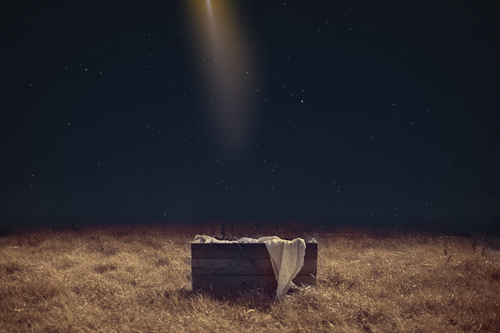Beweise für Gottes Macht
/0 Comments/in Wöchentliche Andacht/by David GuzikHier klicken für einen kostenlosen Buch-Download von Inga-Lill Guzik’s Buch
“Light, Peace, and Hope for Your Christmas”
Es kam aber Furcht über alle Seelen, und viele Wunder und Zeichen geschahen durch die Apostel. (Apostelgeschichte 2,43)
Viele von uns fragen sich, wie es wohl wäre, einige der großen Ereignisse der Geschichte mitzuerleben. Zum Beispiel bedeutsame Schlachten, Durchbrüche, Erfindungen, Triumphe und Tragödien.
Das Leben in der frühen Gemeinde ist eine der Zeiten, in die ich gerne reisen würde, um sie mitzuerleben. Nur beim Lesen von Apostelgeschichte 2, was dort und danach passiert, durchfährt mich eine Begeisterung – es wäre toll, das im Alltag erleben zu dürfen, selbst wenn es nur für eine bestimmte Zeit wäre.

Hier in Apostelgeschichte 2,43 werden zwei bedeutende Dinge genannt, die in dieser aufregenden Zeit passierten. Zuerst lesen wir, es kam aber Furcht über alle Seelen. In der Hoffnung für Alle Übersetzung steht: Eine tiefe Ehrfurcht vor Gott erfüllte alle Menschen. Das an sich war eine Beweis für die Macht Gottes. Diese Menschen, die einst Jesus abgelehnt hatte, hatten ihre Meinung über Ihn komplett geändert. Nun nahmen sie Ihn als Messias, Retter und Herrn an. Darum ehrten sie Jesus und Seine Nachfolger.
Eines der größten, machtvollsten Dinge, die Gott tun kann, ist, das Herz eines Menschen zu verändern, dass es Gott ehrfürchtig ehrt. Diese Furcht, die über alle Seelen kam (oder eine tiefe Ehrfurcht) bedeutet, dass es keine leichte, oberflächliche Sache war. Es gab Freude, doch kein Lachen oder Albernheit. Die Menschen verstanden, dass ein großer Gott ein machtvolles Werk tat.
Wir lesen auch, viele Wunder und Zeichen geschahen durch die Apostel. Als Jesus in den Himmel hinauffuhr, war Er nicht fertig damit, wundersame Dinge auf der Erde zu tun. Ich glaube, dass selbst heute Gott noch nicht fertig damit ist. Wir haben keinen Hinweis darauf, dass dies bedeutete, dass auch die Apostel jederzeit ein Wunder „vollbringen“ konnten – so als ob die Macht der Wunder in ihnen ruhte. Stattdessen sehen wir, dass Gott festsetzte, dass solche Wunder geschehen sollte, und die Apostel waren die bereitwilligen Diener, die sie ausführten.
Diese zwei Dinge – die veränderten Leben (es kam aber Furcht über alle Seelen) und die wundersamen Werke (viele Wunder und Zeichen) waren die Beweise für Gottes Macht. Wo Gott am Werk ist, werden Leben auf wundersame Weise berührt. Wir können Gott nicht vorschreiben, welche Wunder geschehen sollen und wie Er sie machen soll, doch wir werden veränderte Leben und Beispiele für Gottes Macht sehen.
Wenn ich mir die heutige christliche Welt anschaue, dann sehe ich viele Menschen, die sich über Zeichen und Wunder und andere offensichtliche Dinge freuen. Ich verstehe, warum. Wenn es um wahre Wunder geht, die Gott die Ehre geben, will ich mehr davon sehen und nicht weniger!
Ich wünschte mir, dass mehr Christen es wollen, dass Furcht über alle Seelen kommt – einschließlich ihres eigenen Lebens! Lasst uns daran glauben, dass Gott große Dinge tut und überlassen wir Ihm die Sache mit den Wundern. Doch jeder von uns kann demütig in Ehrfurcht zu Ihm kommen. Lasst uns das heute tun.
Evidencia del poder de Dios
/0 Comments/in Devocional Semanal/by David GuzikSobrevino temor a toda persona, y muchas maravillas y señales eran hechas por los apóstoles. (Hechos 2:43)
Muchos de nosotros nos preguntamos ¿cómo sería vivir durante algunos de los grandes acontecimientos de la historia? Pensamos en batallas trascendentales, avances, inventos, triunfos y tragedias e imaginamos como pasó todo de primera mano.
La vida de la iglesia antigua es una de esas épocas que desearía poder volver y tener en la vida real. Hay una emoción inexplicable al leer lo que sucedió en Hechos 2; sería increíble tener esa experiencia en la vida diaria, incluso si solo sea por una temporada corta.

Aquí en Hechos 2:43 menciona dos características importantes de este tiempo emocionante. Primero, leemos que sobrevino temor a toda persona. Me gusta la Nueva Traducción Viviente de esta frase: Un profundo temor reverente vino sobre todos ellos. Esto en sí mismo era evidencia del poder de Dios. Estas personas que una vez rechazaron a Jesús habían cambiado completamente de opinión acerca de Él. Ahora aceptaron a Jesús como Mesías, Salvador y Señor. Por lo tanto, honraron a Jesús y a sus seguidores.
Una de las obras más grandes y poderosas que Dios puede hacer es cambiar el corazón humano hacia un honor reverente de Dios. Este temor que sobrevino a toda persona (o sensación de asombro) significa que no fue un trabajo ligero y superficial. Había alegría, pero no todo era risas y tonterías. La gente entendió que un Dios maravilloso estaba haciendo una obra poderosa.
También leemos que muchas maravillas y señales eran hechas por los apóstoles. Cuando Jesús ascendió al cielo, no había terminado de hacer milagros en la tierra. Creo que aún hoy Dios no ha terminado de hacer milagros. No tenemos ninguna indicación de que esto signifique que incluso los apóstoles podrían “realizar” un milagro en cualquier momento que quisieran, como si el poder del milagro descansara en ellos. En cambio, vemos que Dios dispuso que tales milagros ocurrieran, y los apóstoles fueron los siervos dispuestos a hacer tales milagros.
Estas dos cosas: las vidas cambiadas (sobrevino temor a toda persona) y las obras milagrosas (muchas maravillas y señales) fueron evidencia del poder de Dios.
Cuando miro al mundo cristiano de hoy, veo a muchas personas entusiasmadas con las señales y maravillas y cosas tan obviamente asombrosas. Entiendo porque; cuando se trata de milagros genuinos que verdaderamente dan gloria a Dios, ¡quiero ver más de ellos!
Simplemente desearía que más cristianos quisieran que el temor sobrevino a cada persona, ¡incluso su propia alma! Creamos en Dios por las grandes cosas y dejemos que Él se encargue del departamento de milagros. Sin embargo, cada uno de nosotros puede presentarse humildemente ante Él con asombro y temor reverente. Hagámoslo hoy.
Born in Bethlehem
/0 Comments/in For Pastors, Preachers, Bible Teachers/by David GuzikDear Pastor, Preacher, or Bible Teacher –
Happy Monday! I don’t know what your weekend ministry was like, but I’m praying that today can be a day of refreshment and inspiration to you.
Here are a few thoughts leading up to Christmas from Micah 5:2:
“But you, Bethlehem Ephrathah,
Though you are little among the thousands of Judah,
Yet out of you shall come forth to Me
The One to be Ruler in Israel,
Whose goings forth are from of old,
From everlasting.”

Bethlehem was well known as the hometown of David, Israel’s greatest king; yet it was never a great or influential city. It was truly little among the thousands of Israel. Yet God chose it as the birthplace of the Messiah, the Ruler in Israel.
This passage from Micah 5 was quoted by the chief priests and teachers of the law when Herod asked about the birth of the Messiah (Matthew 2:5-6).
Bethlehem means House of Bread. From eternity past (Whose goings forth are from of old, from everlasting), Jesus came to us as the Bread of Life (John 6:35). Micah’s prophetic voice declared that though Jesus came from Bethlehem, He did not begin there. His goings forth are from eternity past.
Knowing that Jesus’ goings forth are from of old, from everlasting shows us some important things:
– It shows us the glory of Jesus, that He is far more than merely a man.
– It shows us the love of Jesus, that He would leave the glory of heaven for us.
– It shows us the sympathy of Jesus, that He remains fully man and fully God.
– It shows us the nature of Jesus, that He would add humanity to His deity.
Dear servant of God, that glory, love, and sympathy bound up in the nature of Jesus are for you. It isn’t just for the people you serve in Jesus’ name! It’s for you, and you can’t give what you haven’t first received.
Let the glory of the eternal Jesus fill your soul – and then bless others from the overflow!
In Jesus’ Name – David Guzik
Click Here to Receive Email from David for Pastors, Preachers, and Bible Teachers
Community, Not Communism
/1 Comment/in Weekly Devotional/by David GuzikNow all who believed were together, and had all things in common, and sold their possessions and goods, and divided them among all, as anyone had need. (Acts 2:44-45)
There was something special about the early church. They certainly were not perfect, but there was a spiritual life, courage, and true sense of community among them that gives a powerful pattern for believers since their time.
These two verses are a great description of this. We read, all who believed were together. There was an impressive unity and community among believers. We read in Acts 2:41 that among the Jewish people gathered at that Pentecost, some 3,000 responded to Peter’s preaching. Many of those 3,000 new believers came from far away to Jerusalem for Pentecost as pilgrims.

These visitors repented, believed, and were baptized. Afterwards, they didn’t just go their own way – they wanted to grow in their faith and following of Jesus, so all who believed stayed together.
The Jewish people of that day had a tremendous custom of hospitality during any major feast such as Pentecost. Visitors were received into private homes, and no one could charge for giving a bed or a room to a visitor, or for supplying their basic needs. The first Christians took this tremendous feast-time hospitality and made it an everyday thing.
They didn’t just share their lives; they also shared their material possessions. We read that they had all things in common. With so many visitors among the first 3,000 believers, many of them didn’t have jobs. But Christians shared and provided for each other. The early family of Christians had to share if they were to survive.
There have been more than a few people who claim that this was an early expression of communism, or “Christian Communism.” I think that this a misleading and dangerous claim. This was different from communism in at least two important ways. First, it was voluntary. No one forced believers to share their material possessions. No one made them sell their possessions and their goods and to divide them among all. This was voluntary and led by the Holy Spirit.
Forced collectivism – in the form of communism or many forms of socialism – has been a great evil in the world. The goal of a better world through forced collectivism was the claimed justification of the murder of up to 100 million people in the 20th century.
The other difference is that this was temporary. We don’t have any evidence that this continued very long. Instead, it was the spontaneous response to an immediate need.
Yet, there is something wonderful in that they sold their possessions and their goods, and divided them among all, as anyone had need.
The power of God was evident among them because Jesus became much more important to them than their possessions. It was true community.
We all want this kind of community – it sounds wonderful! So today, pray that God would begin with you and give you a sharing heart.





